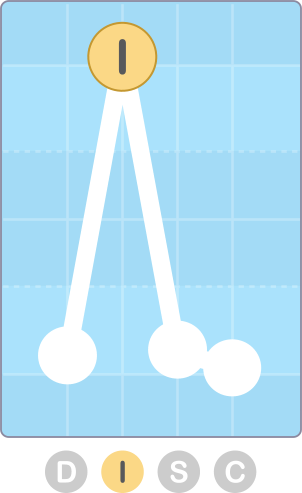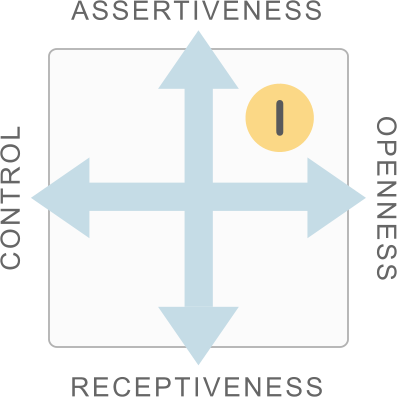The 'I' of DISC stands for Influence, a factor connected to communication, openness and social confidence.

The level of Influence in a personality appears second from the left on a standard DISC graph, following Dominance.
When Influence stands out as a major factor in a person's DISC profile, that profile describes someone with a positive attitude to other people, and the confidence to demonstrate that attitude. People of this kind are at their most comfortable in a social situation, and interact with others in an open and expressive way.
On a Style Card, Influence stands at the point where Assertiveness meets Openness, so High-I individuals are those who are active in approach, and oriented towards other people. This is the root of their socially confident and unreserved attitude.

Influence lies in the top-right quadrant of the Style Card, where Assertiveness meets Openness.
This focus on other people means that High-I's thrive on the attention and approval of other people, and they're more motivated by praise and appreciation than most other types. Despite their outgoing attitude, they're often unwilling to risk causing offence, and they'll often avoid possible confrontations. In other words, while a High-I is socially confident, they tend not to be particularly assertive or forceful.
When Influence is low in a profile, this implies a personality with far less concern for expressing themselves or interacting with others. Low-I's like this tend to turn their focus on more practical topics, concerning themselves more with achieving results than with building relationships.
The social impulses of a High-I individual mean that they'll be attracted to roles where these needs are fulfilled. In other words, high Influence individuals will be at their most motivated surrounded by other people, and with the scope to communicate freely. Conversely, they will tend to avoid more constrained or socially limiting situations.
A natural outlet for a High-I's outgoing style is in the area of sales, marketing or PR, especially in roles where they are able to use their communicative abilities to their fullest. One potential drawback here is that people with just high Influence in their profiles tend to lack the directness to close a sale, and a measure of Dominance can also be important in more challenging situations like direct sales.
Those with high Influence are often found in roles that involve teaching or training, and they can be highly effective in not only communicating ideas, but also inspiring others with their dynamic attitude. Roles of this kind will usually also need a level of expertise and knowledge, but high levels of Influence within the personality can be an important component.
As the factor most involved with direct communication, the kinds of scenarios in which Influence is most significant tend to be those in which communication and interaction are the key components. Here are a few examples:
Of all the factors, Influence is most connected with people who are comfortable with presenting ideas in front of an audience. Indeed, they often find situations like this to be motivating and rewarding, a fact that lends them an assured and enthusiastic presentation style.
High-I's have the confidence to act in a decisive manner, but their focus on other people means that their decisions are often based on the popularity of the various outcomes, rather than purely practical considerations.
In some senses highly Influential people are ideal team players. They are actively interested in building positive working relationships, and they have the natural confidence to help direct the team as a whole. They do tend to take a rather informal approach at times, and this can be counterproductive where the team is working in more pressured conditions.